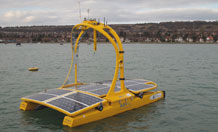
Local residents will be invited to watch the robotic boat, called C-Enduro, in action on March 22. Image courtesy of Professor Peter Challenor
‘Intelligent’ robotic boat piloted by Exeter researchers makes maiden voyage
Researchers from the University of Exeter will be launching a boat with its own intelligence off the Scottish coast this week to test their pioneering software design that could revolutionise data collection at sea.
Professor Peter Challenor from the College of Engineering, Mathematics and Physical Sciences and his team will be trialling a computer algorithm that allows the vessel to collect data at sea without any human intervention.
Professor Challenor will be accompanied by his colleague from the department of Mathematics Eleni Tzortzi and Professor Chris Edwards and Chiara Melucci from the department of Engineering. The project is a collaboration between the University, the Met Office and Marine SouthEast, a not-for-profit organisation working in the marine sector.
Local residents will be invited to watch the robotic boat, called C-Enduro, in action at an open day at the Scottish Association for Marine Science, which hosts the Scottish Marine Robotics Facility near Oban on March 22.
C-Enduro, produced by ASV global, is the size of a small car, uses energy harvesting technology and has the capacity to travel at sea for up to three months over a range of 4,000 miles. It has a self-righting hull and has been built to operate in all marine environments.
The C-Enduro has the potential to dramatically reduce the cost of data collection by removing the need for traditional survey vessels and researchers believe it may produce more accurate data.
“This has been designed for gathering data at less cost and will be useful to the offshore industry and in scientific research,” said Professor Challenor. “We are hoping that once our algorithm has been tested we will be able to licence this technology and convince people to start using it in earnest.”
Professor Edwards added: "Our long term goal is to extend these ideas to multi-vehicle fleets operating autonomously and cooperatively."
Date: 21 March 2016
